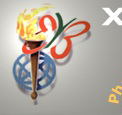| Select
a day
|
__
|
| |
|
Late in a sunny afternoon, buses carrying
all the teams arrived at the staging area near Heroes' Square.
The Australian, British, Pakistani and Thai teams stood ready
to parade into the square, passing the time by posing for
photographs and visiting with the other teams. Local children
prepared to take part in this special occasion by marching
before each team, carrying a sign with the country's name
written in Hungarian on one side and English on the reverse.
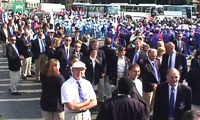
|
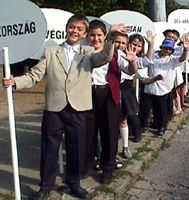 |
| As the early Autumn sun slid lower in the sky,
the temperature gradually fell from about 75 degrees Fahrenheit
down toward 70. A light breeze from the east brought "lamb's
wool" clouds, turning the sky from blue toward grey. No
matter; the excitement of the participants was not in the least
dampened. |
|
|
As marches played on the sound system, horsemen in 19th century
calvary costumes rode to the edge of the square, and then
stood on either side of the parade of teams as they entered
the square.
|
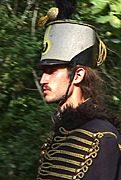 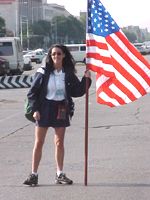 |
|
The ceremony was opened by Zsuzsa Csisztu, a well-known
Hungarian gymnast, and was translated throughout into English.
Ms. Csisztu began the ceremony by introducing Team USA, Great
Britain, then Australia (waving their Aussie-style hats),
and so on, in alphabetical order according to the Hungarian
spelling of the country's name. "Say 'Shalom' to Israel!"
Each team's flag was added to the stands on the stage.
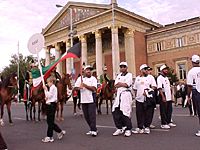
|
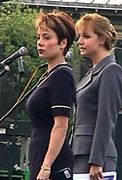
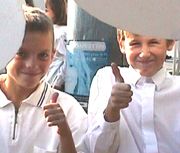
|
| Cheers went up from the crowd with each team's
entrance, and all were applauded. Each team was attired in their
patriotically colored uniforms. When a one-person team came
by, he got extra applause, so he removed his hat and took a
big bow. The French team sang their anthem while parading, and
the Uruguayans had two big drums, which they beat in a celebratory
fashion while chanting "Uruguay! Uruguay!" Accompanied
by the march music playing on the large speakers, the Italians
waved small flags, as did many other teams. As teams formed
a large group in the middle of the square, they would cheer
each other, wave, and smile. |
|
| Following a Games tradition, the host country's
team entered the Square last, to large applause, and the ceremony
proper began. |
|
|
The first speaker was Tamás Deutsch, Minister of Youth and
Sports, who welcomed everyone to Hungary, which is famous
for its hospitality. He made the point that the Games are
not just for those who've already had transplants, but also
for those who are waiting for transplants, so that they will
take courage from witnessing this event. "It is a great
opportunity for the disabled sick people to show themselves
and the world what great achievements they are capable of."
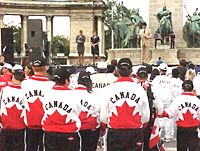
|
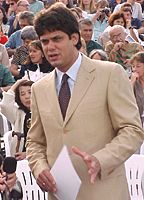
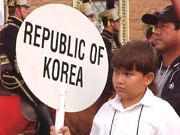
|
|
The banner ceremony followed, in which the Games banner was
formally raised over the proceedings.
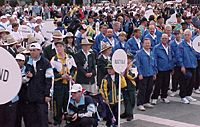
|
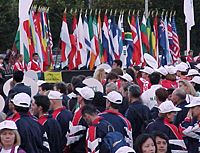
|
|
Famous Hungarian boxer István Kovács (known as "Koko,"
at right in photo) and Hungarian athlete (and local organizing
committee member) Judit Berente read the athlete's oath, Koko
in Hungarian, and Ms. Berente in English. Koko's presence
caused quite a stir; he graciously posed for many photographs
and signed autographs for the crowd.
|
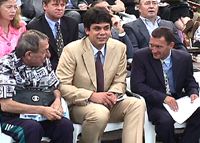 |
|
Maurice Slapak, President of the World Transplant Games Federation,
began by addressing the gathering in Hungarian, which was
a big hit with the crowd. He wished the competitors well,
especially as their presence in Heroes' Square represents
a dream come true. In February 1999, the Hungarians said "Yes,
you can come to Hungary, even though we only have six months
to prepare." Mr. Slapak noted that donation rates rose
thirty percent in Australia as a result of the 1997 World
Transplant Games held there. He urged us to remember "We're
here to compete, we're here to enjoy, and also you are here
to show the benefit of a generous gift, and to say thank you
in the best and most lasting way to all those who gave."
|
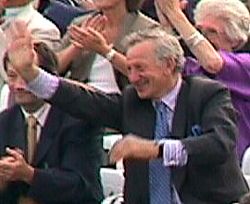
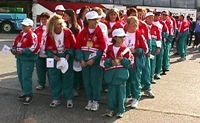
|
|
Professor Ferenc Perner, of the Hungary Society of Transplantation,
mentioned that Hungary is honored to host these Games for
a second time, the first having been eight years ago. He spoke
of the advances in the field of transplantation since that
time, and said that over 3,000 people had since received transplants
in Hungary.
Professor Perner explained that there were several options
raised when the Netherlands local organizing committee announced
that they would not be able to host the Games; one option
was to delay until 2000 and relocate to Sydney, but it was
felt that despite the war nearby and the short preparation
time, they felt it was more important not to disappoint the
athletes, whom he wished well. He also apologized in advance
for any organizational difficulties the attendees may experience
due to the short preparation time.
|
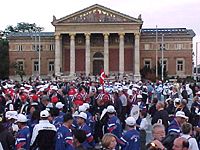
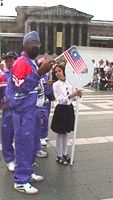
|
| Next we were treated to several folk music pieces performed
by a vocal ensemble accompanied by musicians playing the traditional
stringed instrument (a "lant") and a percussion instrument
(a "csorgo") similar to a tambourine. This hauntingly
beautiful music is quite ancient and truly made us feel we were
in Hungary. |
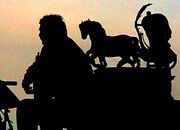 |
|
To cap the festivities, colorfully costumed folk dancers
then took the stage, performing three traditional dances,
accompanied by two violinists, a cellist, and a bassist.
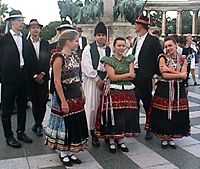
|
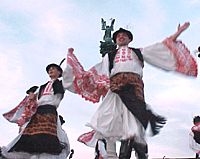
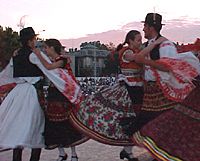
|
| Following the ceremony, everyone walked over to Vajdahunyad
Castle, just east of Heroes' Square. While the sun went down
on this medieval castle grounds, the athletes in their colorful
uniforms congregated. Under festive tents a huge variety of
little Hungarian sandwiches, desserts, and other foods and drinks
were offered. The athletes and their friends and family members
mingled with other participants, talking, laughing, and engaging
in the ever-popular pin-trading, while a live band played dance
music, including the "Macarena." |
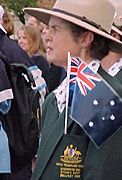 |
| We owe the Hungarians many thanks for arranging
such a nice welcome to Budapest, and a beautiful start to the
Games. |
|
|
|
